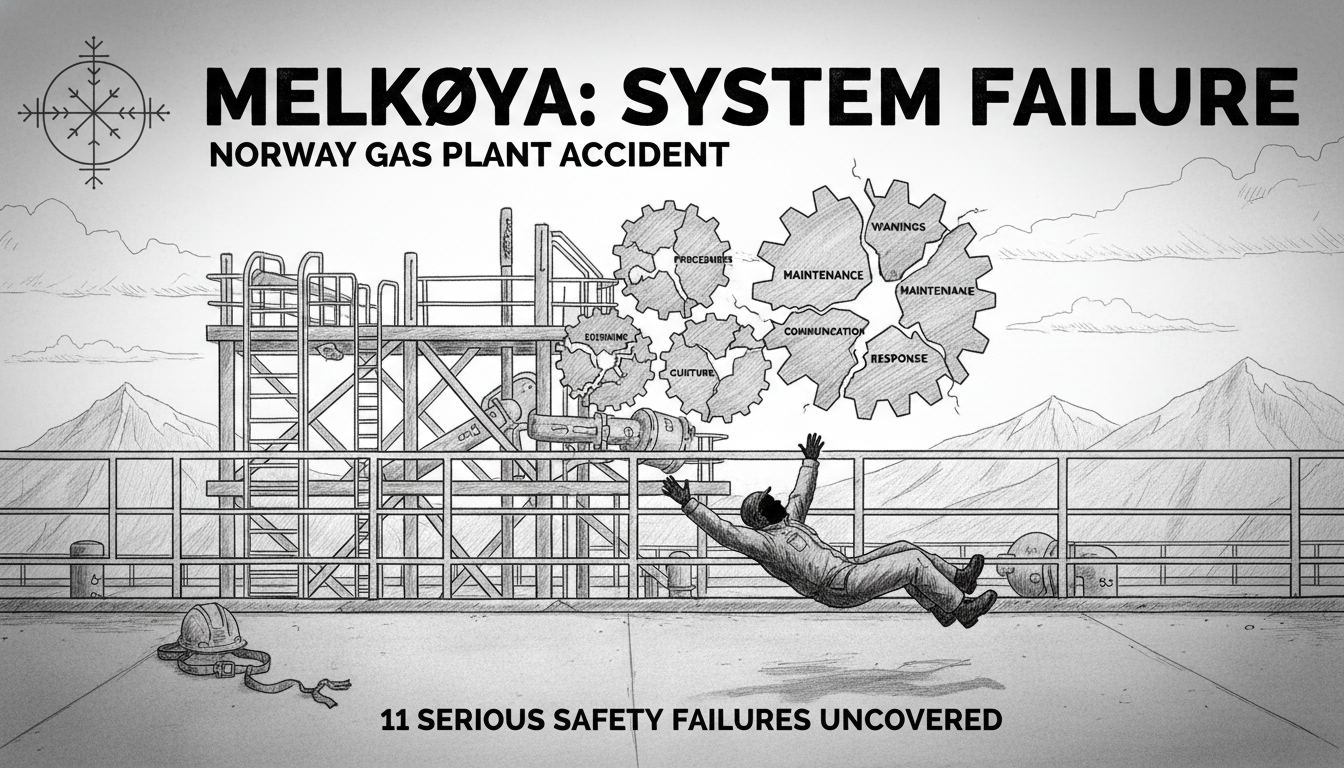Multiple Safety Failures Before Norway Gas Plant Accident
An investigation into April's fall accident at Equinor's Melkøya gas plant reveals 11 serious safety failures, including ignored worker warnings, inadequate training, and management breakdowns. The report shows the 4.4-meter fall could have been fatal and identifies systemic safety culture problems at the northern Norway facility.

An investigation reveals multiple serious safety failures preceded a worker's fall at Equinor's Melkøya gas plant in northern Norway. The April incident saw a worker fall 4.4 meters into concrete, surviving but severely injuring his leg.
The official report states the accident could have been fatal. It identifies 11 key safety failures that created dangerous conditions.
Six months before the accident, approximately 100 workers raised safety concerns about inadequate height safety equipment and insufficient training for working at heights. While some concerns were addressed, height safety issues were ignored according to the investigation.
Construction was behind schedule, creating time pressure according to workers and managers. During the accident week, extra workers were transferred from another site, making the area chaotic and overcrowded.
Several construction managers were away at a company retreat in Tromsø that week. This left one supervisor responsible for 39 workers instead of the normal 12.
Workers discovered safety platforms were missing because they'd been left in a now-restricted area. They reported this to a supervisor who told them to "be creative." Workers then balanced on beams placed across scaffolding.
The investigation found a workplace culture where workers felt unable to refuse or stop dangerous work. The final report states the subcontractor had a safety climate that made it difficult to halt unsafe operations.
Consto, the construction company, says it's working to ensure all employees understand their right and duty to stop unsafe work.
The day before the accident, a safety inspection occurred but focused mainly on ground-level clutter. An inspector did notice one safety harness was incorrectly attached at height.
This prompted Equinor and Consto to hold an evening meeting where they concluded work might not be proceeding safely. They decided to close the site at the next morning's meeting.
But with key managers away in Tromsø, the message never reached the site supervisor. Other managers present "failed to grasp the importance" of the shutdown decision.
The worker who fell had unhooked both safety harness clips to move forward. Investigation shows even if properly attached, the equipment would have allowed a 5.75-meter fall before stopping him - more than the 4.4-meter drop to ground.
Melkøya requires daily work permits describing tasks and potential hazards. The report shows this system barely functioned. Permits didn't properly assess height dangers, and emergency rescue plans for height work were blank forms.
Most workers were temporary staff from employment agencies. Agency Adecco believed all workers had required height safety training, but this was incorrect.
Six of eight workers performing height work that day lacked complete required training. The agency claims it received wrong information about required courses from another company in Equinor's supply chain.
A spreadsheet used by site managers indicated all workers were trained, but managers could only verify training for permanent staff, not temporary workers. No random checks occurred to confirm actual training.
The agency assumed workers had theoretical training and would receive practical training on Melkøya. But the training room had been repurposed the previous summer, and no replacement facility was established in the 10 months before the accident.
The report emphasizes systemic failures rather than individual worker decisions. It identifies numerous preventable safety breakdowns that Equinor must address.
Equinor's director for onshore facilities stated, "We expect everyone to report unsafe conditions. We always have time to work safely, with a right and duty to stop unsafe work."
The company's processing director added, "When employees experience serious accidents at our facilities, it makes a strong impression. Safety is our first priority."
Consto's communications director said the company takes the findings "very seriously" and is evaluating need for additional measures beyond those already implemented.
Adecco's CEO said the company never received orders for required industry training from the client, and wasn't shown Equinor's report before publication.
The investigation reveals a cascade of safety management failures at one of Norway's most important energy facilities. Basic safety protocols were repeatedly bypassed despite worker warnings, showing concerning gaps in safety culture at the high-risk industrial site.